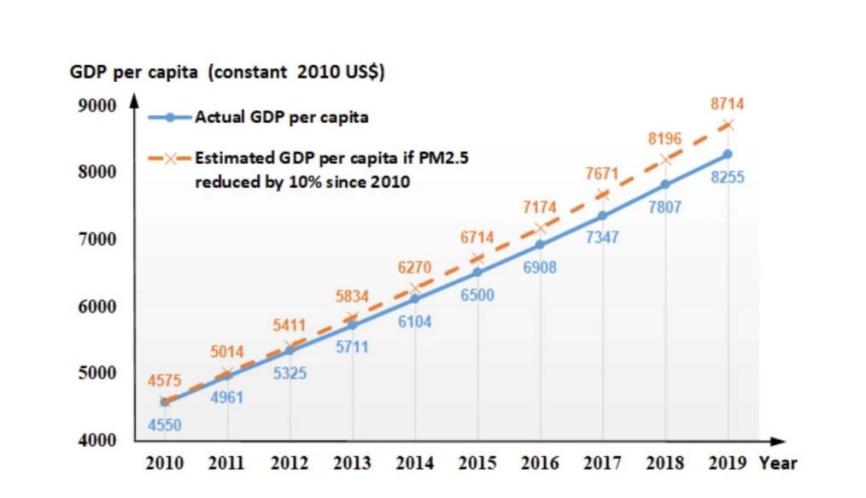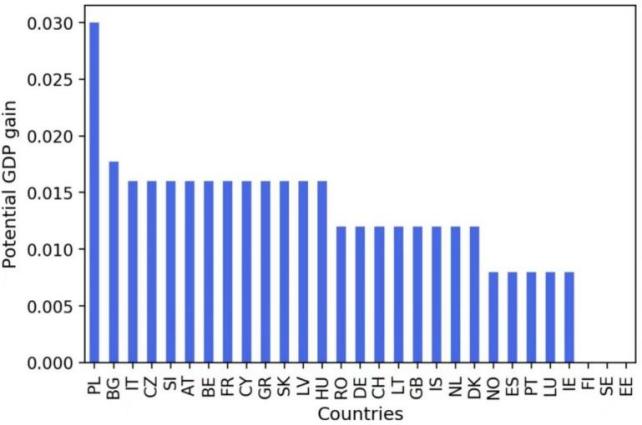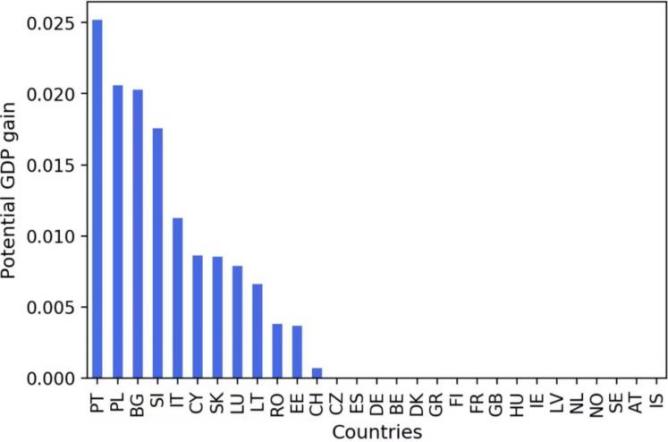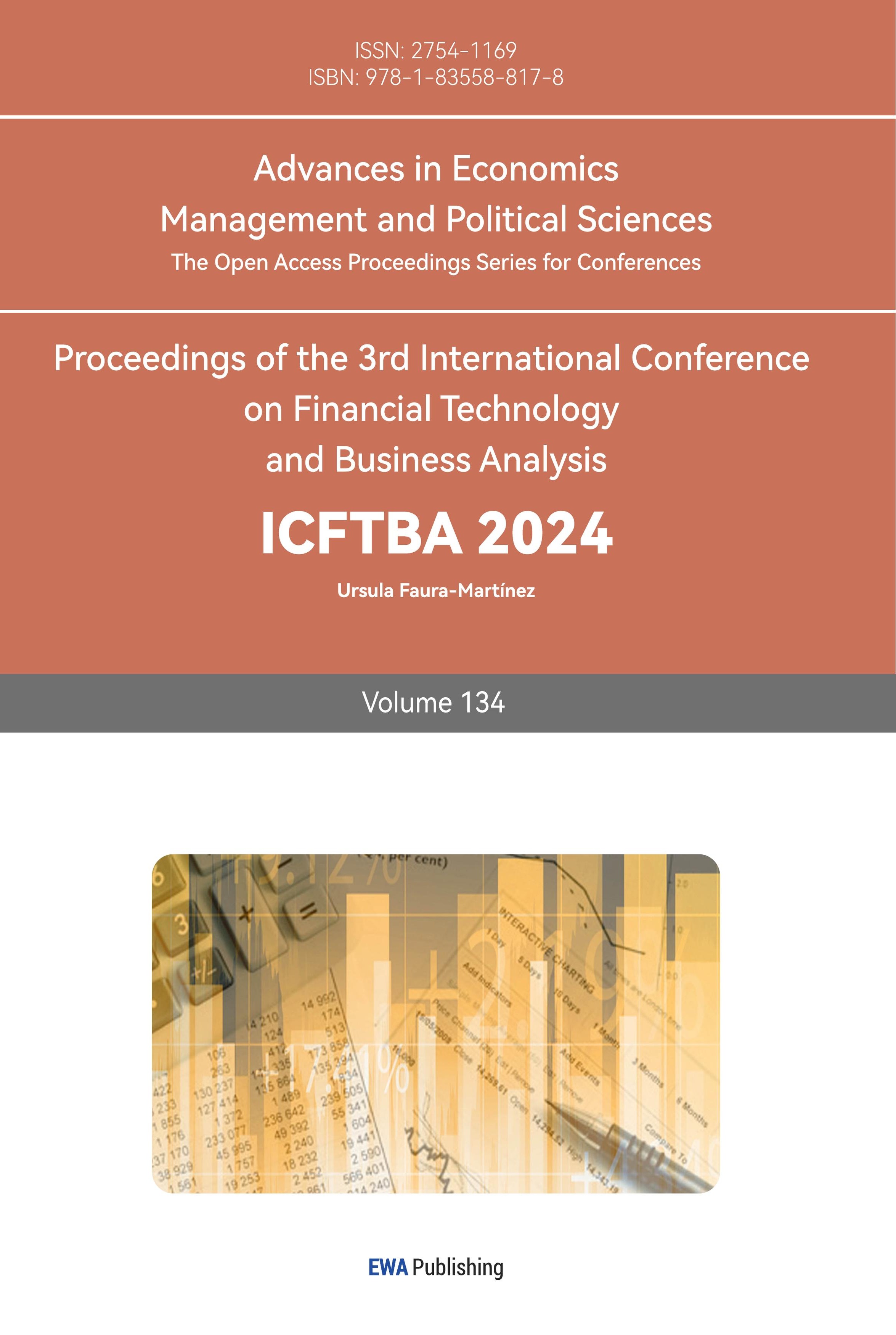1. Introduction
Air pollution represents a substantial risk to sustainable development in numerous places worldwide. Extensive medical and environmental research has consistently shown that air pollution negatively impacts human health. Furthermore, it possesses considerable economic ramifications, affecting several aspects of economic activity such as labor productivity, housing prices, pay differentials, population mobility, and the tourism sector [1].
Initiatives to mitigate the environmental and physiological effects of air pollution have persisted for decades. Numerous nations have adopted multi-pollutant management measures to mitigate the health concerns associated with pollutants such as particulate matter, ozone, nitrogen dioxide, and sulfur dioxide. For example, China launched the National Clean Air Action Plan (2013–2017) and later introduced the Three-Year Action Plan for Clean Air in 2018, aiming to reduce emissions from multiple pollution sources. Research has regularly demonstrated substantial economic advantages from air pollution mitigation strategies.
The influence of air pollution on human health has necessitated the establishment of progressively stringent environmental legislation globally. Nevertheless, debate persists regarding the optimal level of rigor for these requirements. Environmental regulations are frequently perceived as a trade-off between the health advantages they offer and the economic burdens they create, as resources are reallocated from productive endeavors to pollution mitigation initiatives [2]. Certain high-income nations mandate periodic evaluations of the costs and benefits associated with proposed environmental regulations. The U.S. Environmental Protection Agency (EPA) required to perform cost-benefit evaluations of the Clean Air Act [3].
The research examines the economic consequences of more stringent environmental rules. A thorough literature analysis was performed to evaluate the economic ramifications of global air pollution reduction measures, focusing on the expenses associated with air pollution. The research indicated that health advantages resulting from enhanced air quality can boost productivity, hence increasing economic output. The study highlights the necessity of enhancing air quality to mitigate health hazards and promote economic development, offering policymakers fresh perspectives on the correlation between environmental rules and economic advantages.
2. Literature Review
Comprehending the correlation between air pollution and economic growth is essential, as both unpolluted air and economic advancement are vital for sustainable development [1]. Numerous prior research have frequently investigated this link within the context of the Environmental Kuznets Curve (EKC). The EKC theory posits that economic progress first results in environmental degradation; but, upon attaining a specific income threshold, environmental quality subsequently enhances. The relationship between economic growth and pollution is likely more intricate and reciprocal [4]. Given that economic activities are affected by environmental circumstances, pollution can also influence the pace of economic growth [5].
While these studies suggest that air pollution affects economic development, it cannot be conclusively stated that air pollution's impact on economic growth has been fully confirmed. This is due to the fact that the majority of these research utilized GDP or GDP per capita as the dependent variable, indicating that the regression outcomes predominantly illustrate the immediate influence of air pollution on the economic scale rather than its enduring effect on economic growth [4].
In summary, there are multiple deficiencies in the current literature: (1) While it may seem logical to presume that air pollution adversely influences economic growth, there is a lack of empirical evidence to substantiate this assertion directly, especially concerning the measurement of air pollution's effects. Prior research frequently employed GDP (or GDP per capita) levels instead of growth rates, which align more closely with the theory of economic growth. The current literature has insufficiently examined the impact of air pollution in locations with varying macroeconomic frameworks.
3. Case analysis
3.1. The Impact of Air Pollution on China’s Economic Growth
China's economic growth has experienced a modest slowdown in recent years. This raises concerns regarding China's ability to sustain its economic growth in the future. A recent study indicates that air pollution significantly threatens China's economic growth. This study suggests that China must enact effective regulations to address air pollution, as economic growth and clean air are not mutually exclusive.
Figure 1 juxtaposes the projected GDP (Gross Domestic Product) per capita under the air pollution mitigation scenario with the actual data from 2010 to 2019. The graph demonstrates that the disparity between real and estimated values increases. In 2019, China's real GDP per capita was USD 8,255, whereas the estimated figure was USD 8,714, surpassing the actual level by more than 5.6%. Moreover, China's GDP in 2019 was approximately USD 11.5 trillion. If PM2.5 levels had decreased by 10% since 2010, GDP may have attained USD 12.1 trillion, representing a variance of USD 0.6 trillion, approximately equal to the economic production of Poland or Sweden. The advantages of mitigating air pollution are substantial regarding GDP and GDP per capita.

Figure 1: Level of GDP per capita of China during 2010-2019 [4]
Previous research has shown that the Chinese economy has been significantly impacted by poor air quality, both directly and indirectly. The estimated impact of pollution levels exceeding the World Health Organization's recommended thresholds on China's GDP rose from $15 billion ($23 billion in ambient levels) in 1970 to $50 billion ($79 billion in ambient levels) by 2000 [6]. Tourism has been notably affected, highlighting the negative effects of air pollution on tourist arrivals and revenue. Agricultural losses attributable to air pollution are significant; for example, SO2 pollution alone resulted in around $1.43 billion in agricultural damage in 2008. Air pollution imposes significant socioeconomic costs, encompassing health problems, hospitalizations, mortality, and medical expenditures, resulting in diminished efficiency and productivity in labor-intensive sectors such as call centers, garment manufacturing, and textiles [7]. Additionally, high-tech industries may suffer due to hindered human capital development and slowed innovation and R&D progress caused by pollution.
The findings suggest that governmental efforts to enhance air quality can yield significant economic benefits. Continuous initiatives to improve air quality standards are crucial for diminishing premature mortality, morbidity, and economic detriment [8].
3.2. Contribution of Environmental Policy to Economic Growth: Evidence from Europe
In May 2008, the European Commission introduced Directive 2008/50/EC, which established new air quality standards for PM2.5. This directive mandates that Member States reduce PM2.5 exposure in urban areas by 2020, with reduction targets varying based on the average concentration levels from the reference years 2008-2010. For instance, countries with initial PM2.5 concentrations between 18 μg/m³ and 22 μg/m³ must cut levels by 20% by 2020, while countries with initial levels between 8.5 μg/m³ and 13 μg/m³ are required to reduce them by 10%. Countries with values below 8.5 μg/m³ are not subject to a reduction target. Figure 2 delineates the requisite targets by country. The methods to achieve these targets are left to the discretion of the Member States. Even countries with relatively low pollution, like Norway, are expected to see notable GDP increases, around 0.8%, while countries such as Germany and the UK are anticipated to experience increases of 1.2%.

Figure 2: Required reduction of air pollution based on EC Directive 2008/50 [2]
To demonstrate the potential impact, researchers calculated the predicted GDP effects for all European Union Member States if they achieve the pollution reduction targets specified in Directive 2008/50/EC. These results are displayed in Figure 3. The model predicts an average GDP growth of 1.28% for Europe between 2010 and 2020, assuming all countries meet their targets, after accounting for the abatement costs of approximately 0.01% of GDP. This average statistic conceals considerable disparities among nations. For example, the most polluted nations with rigorous objectives, such as Poland and Bulgaria, may have GDP growth of 2.9% and 1.7%, respectively. Other countries such as Austria, Belgium, Italy, the Czech Republic, and France are expected to experience around 1.5% GDP growth.

Figure 3: Predicted impact of EC Directive 2008/50 on country-level GDP [2]
With eight years having passed since the implementation of the legislation, it is pertinent to evaluate progress toward meeting these targets and the potential additional GDP gains if the remaining obligations are fulfilled (Figure 4). Seventeen countries have already met their targets, so no further GDP gains are expected for them, though additional benefits from further reductions in PM2.5 concentrations could still be realized. For the 12 countries yet to meet their targets, achieving these goals could result in an additional 1.07% GDP growth, equating to a 0.24% increase for the EU. Countries significantly distant from their objectives, such as Portugal, which has lately experienced a surge in pollution, may witness GDP increases of up to 2.5%. The findings indicate that air pollution management policies may have substantially enhanced recent economic growth in Europe, facilitating economic convergence between Eastern and Western Europe, with the potential for further economic development in the future [2].

Figure 4: Potential GDP gain for countries that have not yet met the EC 2010/50 targets [2]
4. Results and Discussion
The findings presented in the passage underscore the persistent and critical challenge of air pollution in China, despite its extensive efforts to mitigate it. In spite of some advancements in technology, regulatory measures, and public involvement leading to certain improvements, the present air quality is still significantly inadequate. The World Bank’s data from 2017 reveals that nearly the entire Chinese population was exposed to PM2.5 levels exceeding the World Health Organization (WHO) guidelines. This highlights the magnitude of the problem, particularly in densely populated and industrially active regions such as eastern China. Nonetheless, the pollution issue extends beyond metropolitan locales, with considerable pollution levels observed in northern and central China, signifying the need for a holistic national strategy [4].
The broader implications of air pollution reduction, as noted in studies from other regions, further support the argument for stricter air quality regulations. The findings indicate that the economic advantages of mitigating air pollution encompass not only health enhancements and decreased mortality but also heightened economic production and productivity [2]. In Europe, for example, air pollution has been shown to reduce per capita output, indicating that pollution control policies could be integral to driving long-term productivity growth. The U.S. experience with the Clean Air Act serves as a significant case study on the economic advantages of air quality restrictions, with projected benefits amounting to trillions of dollars over many decades [3].
The policy implications suggest that reducing air pollution can be achieved by transitioning from conventional to renewable energy sources. Governments should actively support this shift by encouraging stakeholders to adopt cleaner energy options, potentially through measures like taxing firms that contribute to air pollution [2]. This strategy could reduce pollution levels and diminish healthcare expenses linked to pollution-related health problems [9]. Among the pollution control measures analyzed, the LPG leak control measure stands out, providing health benefits that far outweigh its implementation costs, making it highly cost-effective. Additionally, the investment required for the LPG leak measure is relatively low, enhancing its political feasibility [10]. Another promising measure is taxi fleet renovation, which offers substantial fuel savings, significant improvements in public health, and considerable reductions in greenhouse gas (GHG) emissions. This aligns with previous findings that improving transportation efficiency is crucial for addressing both local and global air pollution.
5. Conclusion and policy implications
The findings of this article underscore the significant and multifaceted impact of air pollution on economic growth. In examining China's recent efforts to address air quality, the study highlights the substantial economic losses attributable to pollution. While government initiatives and technological innovations have contributed to some improvements, the current air quality remains a serious concern, impeding long-term economic growth and development. The analysis also draws from international case studies, including Europe and the United States, where stringent air pollution regulations have demonstrated clear economic benefits.
In conclusion, this study reinforces the importance of air quality management policies that not only improve environmental and public health outcomes but also enhance economic performance. Effective pollution control strategies, particularly those targeting PM2.5 and other harmful pollutants, are essential to fostering sustainable economic growth. Future policy efforts should focus on deepening the integration of environmental and economic goals, ensuring that air pollution reduction is seen as an investment in both public health and economic development.
While this study provides valuable insights into the economic implications of air pollution control, several limitations should be acknowledged. Firstly, the analysis primarily relies on existing literature, which may not encompass the most recent data or localized studies, potentially overlooking specific regional impacts. Secondly, the economic models used may not fully capture the long-term benefits of improved health outcomes, as they often focus on short-term costs versus immediate benefits.
To address these shortcomings, future research could incorporate more localized case studies to provide a comprehensive understanding of air pollution's effects across different regions. Additionally, developing dynamic economic models that account for long-term health benefits and productivity gains could yield more accurate assessments. By expanding the scope of research and employing more sophisticated analytical tools, future studies can enhance the understanding of the complex relationship between air quality, health, and economic performance.
References
[1]. Wang, S. et al. (2024) ‘The costs, health and economic impact of air pollution control strategies: a systematic review’, Global Health Research and Policy, 9(30). Available at: https://doi.org/10.1186/s41256-024-00373-y (Accessed: 12 September 2024).
[2]. Dechezleprêtre, A., Rivers, N. and Stadler, B. (2020) The Economic Cost of Air Pollution: Evidence from Europe. OECD Economics Department Working Papers No. 1584. Available at: https://dx.doi.org/10.1787/56119490-en (Accessed: 12 September 2024).
[3]. Yang, T., Matus, K., Paltsev, S. and Reilly, J. (2005) Economic Benefits of Air Pollution Regulation in the USA: An Integrated Approach, MIT Joint Program on the Science and Policy of Global Change. Available at: http://MIT.edu/globalchange/ (Accessed: 12 September 2024).
[4]. Dong, D., Xu, B., Shen, N. and He, Q. (2021) 'The Adverse Impact of Air Pollution on China’s Economic Growth'. Available at: https://doi.org/10.3390/su13169056 (Accessed: 12 September 2024).
[5]. Kovari Zaim, K. (1999) 'Modified GDP Through Health Cost Analysis of Air Pollution: The Case of Turkey', Environmental Management, 23(2), pp. 271–277.
[6]. Matus, K.J. (2005) Health Impacts from Urban Air Pollution in China: The Burden to the Economy and the Benefits of Policy.
[7]. Sun, R. and Gu, D. (2008) 'Air Pollution, Economic Development of Communities, and Health Status Among the Elderly in Urban China', American Journal of Epidemiology. pp. 1311–1318. Available at: https://academic.oup.com/aje/article/168/11/1311/121917 (Accessed: 12 September 2024).
[8]. Cui, L. et al. (2020) ‘Analyses of air pollution control measures and co-benefits in the heavily air-polluted Jinan city of China, 2013–2017’. Available at: https://doi.org/10.1038/s41598-020-62475-0 (Accessed: 12 September 2024).
[9]. Mujtaba, G. and Shahzad, S.J.H. (2020) ‘Air pollutants, economic growth, and public health: implications for sustainable development in OECD countries’, Environmental Science and Pollution Research. Available at: https://doi.org/10.1007/s11356-020-11212-1 (Accessed: 12 September 2024).
[10]. McKinley, G.A. et al. (2005) ‘Quantification of local and global benefits from air pollution control in Mexico City’, Environmental Science & Technology, 39(7), pp. 1954-1961. Available at: https://doi.org/10.1021/es035183e (Accessed: 12 September 2024).
Cite this article
Wei,Z. (2024). The Economic Impact of Air Pollution on Economic Growth. Advances in Economics, Management and Political Sciences,134,75-80.
Data availability
The datasets used and/or analyzed during the current study will be available from the authors upon reasonable request.
Disclaimer/Publisher's Note
The statements, opinions and data contained in all publications are solely those of the individual author(s) and contributor(s) and not of EWA Publishing and/or the editor(s). EWA Publishing and/or the editor(s) disclaim responsibility for any injury to people or property resulting from any ideas, methods, instructions or products referred to in the content.
About volume
Volume title: Proceedings of the 3rd International Conference on Financial Technology and Business Analysis
© 2024 by the author(s). Licensee EWA Publishing, Oxford, UK. This article is an open access article distributed under the terms and
conditions of the Creative Commons Attribution (CC BY) license. Authors who
publish this series agree to the following terms:
1. Authors retain copyright and grant the series right of first publication with the work simultaneously licensed under a Creative Commons
Attribution License that allows others to share the work with an acknowledgment of the work's authorship and initial publication in this
series.
2. Authors are able to enter into separate, additional contractual arrangements for the non-exclusive distribution of the series's published
version of the work (e.g., post it to an institutional repository or publish it in a book), with an acknowledgment of its initial
publication in this series.
3. Authors are permitted and encouraged to post their work online (e.g., in institutional repositories or on their website) prior to and
during the submission process, as it can lead to productive exchanges, as well as earlier and greater citation of published work (See
Open access policy for details).
References
[1]. Wang, S. et al. (2024) ‘The costs, health and economic impact of air pollution control strategies: a systematic review’, Global Health Research and Policy, 9(30). Available at: https://doi.org/10.1186/s41256-024-00373-y (Accessed: 12 September 2024).
[2]. Dechezleprêtre, A., Rivers, N. and Stadler, B. (2020) The Economic Cost of Air Pollution: Evidence from Europe. OECD Economics Department Working Papers No. 1584. Available at: https://dx.doi.org/10.1787/56119490-en (Accessed: 12 September 2024).
[3]. Yang, T., Matus, K., Paltsev, S. and Reilly, J. (2005) Economic Benefits of Air Pollution Regulation in the USA: An Integrated Approach, MIT Joint Program on the Science and Policy of Global Change. Available at: http://MIT.edu/globalchange/ (Accessed: 12 September 2024).
[4]. Dong, D., Xu, B., Shen, N. and He, Q. (2021) 'The Adverse Impact of Air Pollution on China’s Economic Growth'. Available at: https://doi.org/10.3390/su13169056 (Accessed: 12 September 2024).
[5]. Kovari Zaim, K. (1999) 'Modified GDP Through Health Cost Analysis of Air Pollution: The Case of Turkey', Environmental Management, 23(2), pp. 271–277.
[6]. Matus, K.J. (2005) Health Impacts from Urban Air Pollution in China: The Burden to the Economy and the Benefits of Policy.
[7]. Sun, R. and Gu, D. (2008) 'Air Pollution, Economic Development of Communities, and Health Status Among the Elderly in Urban China', American Journal of Epidemiology. pp. 1311–1318. Available at: https://academic.oup.com/aje/article/168/11/1311/121917 (Accessed: 12 September 2024).
[8]. Cui, L. et al. (2020) ‘Analyses of air pollution control measures and co-benefits in the heavily air-polluted Jinan city of China, 2013–2017’. Available at: https://doi.org/10.1038/s41598-020-62475-0 (Accessed: 12 September 2024).
[9]. Mujtaba, G. and Shahzad, S.J.H. (2020) ‘Air pollutants, economic growth, and public health: implications for sustainable development in OECD countries’, Environmental Science and Pollution Research. Available at: https://doi.org/10.1007/s11356-020-11212-1 (Accessed: 12 September 2024).
[10]. McKinley, G.A. et al. (2005) ‘Quantification of local and global benefits from air pollution control in Mexico City’, Environmental Science & Technology, 39(7), pp. 1954-1961. Available at: https://doi.org/10.1021/es035183e (Accessed: 12 September 2024).









